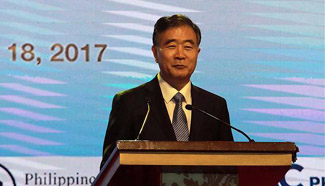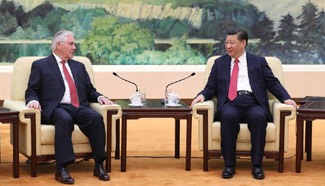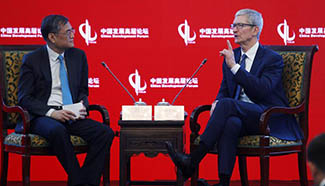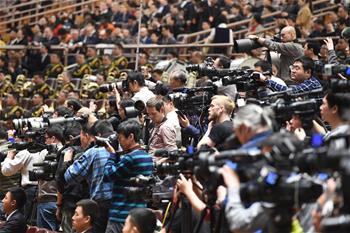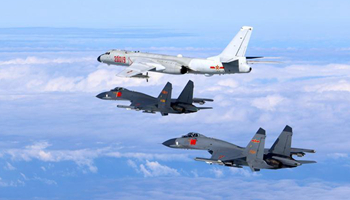BEIJING, March 19 (Xinhua) -- Despite murmurs of prospect clashes between the world's two trade giants, drumbeats for a China-U.S. trade war are increasingly muted when both sides underscore closer win-win economic cooperation.
As the new administration of the United States sent its first cabinet-level official to China for a visit, the messenger echoed a sequence of rapport-building gestures made on the Chinese side.
Visiting U.S. Secretary of State Rex Tillerson said, in his talks with Chinese Foreign Minister Wang Yi on Saturday, it is necessary for both countries to have closer cooperation and coordination to face the changing international situation.
The significance of intensifying Chinese-U.S. economic cooperation is also emphasized by both Chinese Finance Minister Xiao Jie and U.S. Treasury Secretary Steven Mnuchin when meeting on the sidelines of the G20 Finance Ministers and Central Bank Governors Meeting in Germany on Saturday.
Both sides believe cooperation is significant not only to both countries but also to the world's economic growth.
China and the United States should treasure the hard-won achievements of bilateral economic cooperation, the finance ministers agreed.
As Premier Li Keqiang put it earlier this month, China does not want to see a trade war between the top two economies, and if there were a trade war, it would be foreign-funded companies, particularly U.S. firms, that would loose out.
If there is any lingering temptation to escalate trade frictions, remember that neither side would emerge triumphant from damaging a closely interwoven relationship that has benefited the two nations over the past four decades.
Official data showed bilateral trade surged from 2.5 billion U.S. dollars in 1979 to 519.6 billion U.S. dollars in 2016, an increase of over 200 times.
The China-U.S. relationship is based on mutually-beneficial trade, experts agreed at the ongoing China Development Forum 2017, which will end on Monday.
Bilateral economic ties serve as the ballast and engine for China-U.S. relations, according to former U.S. secretary of the treasury Henry Paulson, adding that both countries had benefited from the nearly 600-billion-dollar trade relationship.
Over the past decade, U.S. exports to China grew at an average annual rate of 11 percent, while imports from China rose 6.6 percent each year on average.
The United States is more dependent on Chinese imports, not the other way around, according to Zhou Mi, a researcher with the Chinese Academy of International Trade and Economic Cooperation affiliated to the Ministry of Commerce.
China, equipped with a complete industrial system, could not be substituted by any other country in providing the products to the Untied States, Zhou said.
As Sino-U.S. relations become more complex and important than before, more dexterity is needed to seize the opportunities amid huge challenges, Paulson said.
China and the Trump administration need to establish a dialogue mechanism as soon as possible, he said, citing the role of the China-U.S. Strategic and Economic Dialogue in win-win cooperation.
His view was echoed by Charlene Barshefsky, a former U.S. trade representative, who said both China and the United States bear the responsibility to build mutually-beneficial bilateral ties and ensure an open global market.
As a matter of fact, China and the United States are closely intertwined through their trade relations, said Peter Nolan, director of Cambridge University's Center of Development Studies.
Made-in-China products have benefited American families, who could buy quality goods at lower prices, Nolan said.
Bilateral trade was also credited for creating some 2.6 million jobs and contributing 216 billion U.S. dollars for economic growth in the United States in 2015, according to an Oxford Economics report.
Commerce Minister Zhong Shan warned earlier that a trade war between China and the United States is not in line with the interests of the two countries and would bring nothing but harm.
Cooperation is the "only right choice," and the two countries should work to enhance cooperation and manage any differences, Zhong said, stressing the role of economic and trade cooperation as a "ballast" and "propeller" in bilateral relations.





